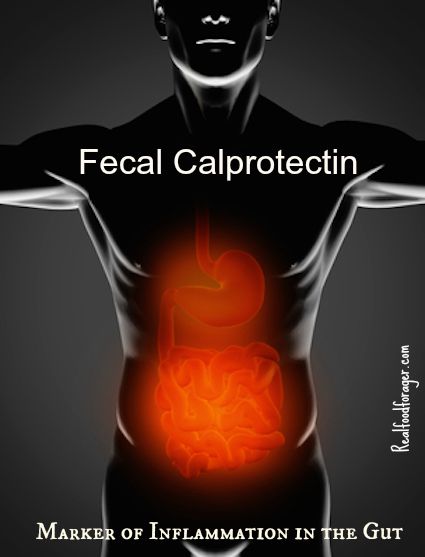Technology improves our lives and this non-invasive test is a highly accurate marker of inflammation in the gut and can be used to monitor gut inflammation. For those with inflammatory bowel disease, this can be a lifesaver.
In the past, blood tests were used to monitor gut inflammation, such as C-Reactive Protein and/or Erythrocyte Sedimentation Rate (ESR).
However, as a clinician, I found that they were not terribly accurate and certainly not helpful in predicting a flareup.
This simple test requires a small collection of stool and can predict increasing inflammation levels up to 3 months before a flareup. That gives the doctor and the patient time to tighten up the diet, add medications and/or supplements to bring the inflammation down before it gets out of control.
What is Calprotectin?
Fecal Calprotectin is a chemical marker of gastrointestinal inflammation that is produced by white blood cells (specifically the neutrophils) in the gastrointestinal tract. It may be used to measure the degree of inflammation present.
It is also used as a way to differentiate between IBS (Irritable Bowel Syndrome) and IBD (Inflammatory Bowel Disease) without having to send the patient for a colonoscopy. (FDA approved)
IBS is a generalized diagnosis that is made by elimination of other conditions. By default. If your symptoms fit into one of the boxes that describe IBS then that is what you are told you have. Usually a colonoscopy is preformed to rule out other, structural causes. This is an invasive procedure and is negative in over 90% of cases.
Having this information in a non-invasive way is extraordinarily helpful and may reduce unnecessary endoscopic procedures, medications and office visits.
Fecal Calprotectin – a Predictive Tool
Elevation of Fecal Calprotectin levels may be associated with infections, inflammation or malignant disease. Fecal Calprotectin is also described in peer-reviewed literature as a useful tool to monitor the effectiveness of treatments and assess for relapse in patients with IBD.
Need for clinical intervention based on Calprotectin levels have been described in the peer-reviewed literature as follows:
- < 50 µg/g – Normal. This likely indicates that there is no active GI inflammation. Studies suggest that a person with positive Rome criteria and a normal Calprotectin (< 50 µg/g) has virtually no chance of having IBD.
- >50 120 µg/g – Borderline [Re-evaluate 4 – 6 weeks]
- >120 µg/g – Abnormal [Determine source of inflammation, treat and repeat as clinically indicated]
- =250 µg/g associated with high risk of clinical relapse in patients with IBD
Most labs now perform (or send to the appropriate lab) this test and results are usually available within a week.
The patient merely has to bring the stool sample to the lab with a doctors prescription.
Great Technology on the Horizon
This technology has been developed in Europe for a Fecal Calprotectin home kit (IBdoc) that is associated with an App on a smart phone. This is very exciting news because patients can do the test themselves in the privacy of their own home and even better – get the result within 15 minutes! Wow! This will be great for those who need this information!
Find out more about IBdoc here!
Find out about clinical trials for this device here!
If you have IBD ask your doctor about using this test!
Related articles:
REMINDER:
Don’t forget to get this FREE mini audio course that you’ll love: 4 SIMPLE Habits for Healthy Families — it’s only free for a few days and it features 4 of my favorite online Mamas! Once you sign up you’ll be set to get early notice of an upcoming screaming deal on a book bundle, which my go grain free online e-course is a part of! Click here to grab yours!












